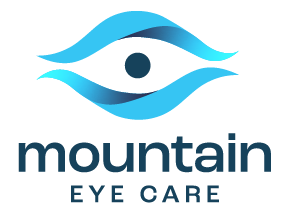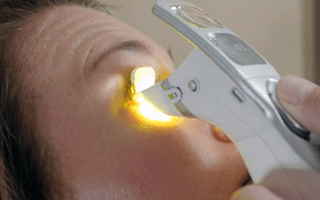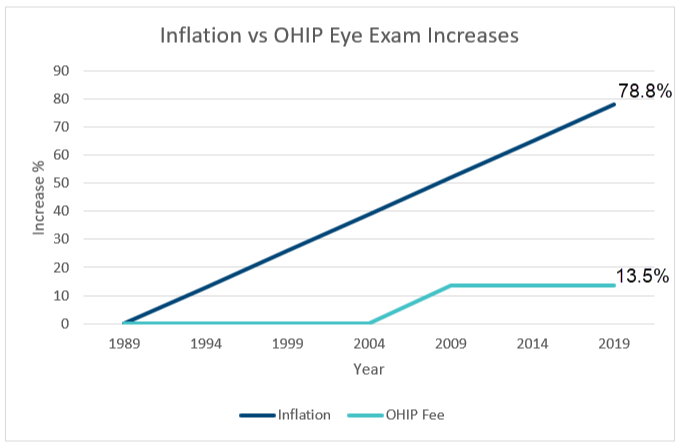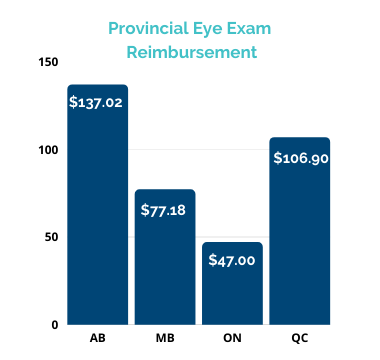5 Benefits of Eye Exams for Your Health
The eyes are extremely important. They help to ensure that we can see everything around us, and they allow us to communicate with others through the use of various facial expressions. However, a lot of people do not realize just how delicate eye health can be until it is too late. The eyes are very susceptible to damage, but by scheduling regular eye exams, it is possible to prevent major problems from occurring. In this article by Mountain Eye Care, we share some information about the five benefits of eye exams for your health.
Click here to schedule an appointment at Mountain Eye Care today.
Eye Exams Are Great for Detecting Glaucoma, Cataracts, and Other Diseases One of the best ways that eye exams can help your health is by helping doctors detect potentially harmful diseases. These exams are able to quickly assess the state of your eyes in order to spot issues such as glaucoma and cataracts at their earliest possible stage. This is important because these conditions, if left untreated, can lead to blindness or major vision loss. Eye Exams Allow You to Talk with Your Doctor About Any Eye Concerns You Might Have
One of the biggest downfalls of eye exams is that they are often only conducted when someone is experiencing eye problems. However, this can lead to many issues because it allows the early stages of certain conditions to go undetected. By conducting regular eye exams, you can ensure that your doctor is able to identify any potential issues before they become serious enough to
impact your vision.
Eye Exams Allow You to Understand the Link Between Eye Health and Other Medical Conditions
Aside from eye diseases, there are a number of other health issues that can impact your eyesight. For example, diabetes and high blood pressure can both increase your chances of developing cataracts or glaucoma down the line. Thus, it is important to speak with your doctor about any health concerns that you have so that they can help you manage them effectively. Eye Exams Help You to Save Money in the Long Run
Finally, it is worth noting that eye exams usually lead to healthier eyes and, thus, a longer lifespan. This means there is less of a risk for long-term health conditions such as glaucoma or macular degeneration, which can become extremely expensive to treat. In fact, the average cost of a pair of eyeglasses is around $250. By scheduling regular eye exams, you will be able to catch any changes in your eyesight as soon as possible so that they do not progress into major issues down the line.
Eye Exams Can Help You Save Money
Regular eye exams are always recommended because they allow your doctor to identify any potential issues with your eyesight. Many people believe that regular eye exams are only necessary for those who have already experienced vision problems, but the truth is that these exams can actually help you to avoid eye diseases by spotting them at their earliest possible stage. For example, glaucoma is a common eye disorder that can lead to blindness over time if left untreated. However, the only way to detect the disease in its early stages is by conducting regular eye exams in which your doctor uses a special device known as a slit lamp to examine your optic nerve and retina in order to look for changes in their texture and color. As a result, this means that eye exams can actually help you to save money in the long run because they allow
doctors to detect serious conditions at their earliest possible stage when treatment is more affordable.
Comprehensive Eye Exams- What to Expect
Eye health is often overlooked until there is a problem. That’s why it’s important to have a comprehensive eye exam every year. An eye exam includes a number of tests that can detect problems with your vision, your eyesight, and even problems with your overall health.
One of the most important parts of a comprehensive eye exam is the dilated eye exam. This part of the exam involves using special eye drops to dilate (or enlarge) your pupils. This allows your ophthalmologist to get a better look at the back of your eyes, where many serious diseases can develop.
During your eye exam, your ophthalmologist will also test your visual acuity or how well you see. This test is very important for children who may not be able to accurately report symptoms of vision problems.
Your ophthalmologist will also assess how well your eyes work together and look for signs of more common eye diseases such as glaucoma, macular degeneration, and cataracts. He or she may also test the health of your retina, optic nerve, and retinal blood vessels.
Should Children get their Eyes Examined?
Most parents know that it is important for their children to have regular check-ups with the doctor. But what about eye exams? Should children get their eyes examined on a regular basis, just like they do with other parts of their body?
The answer is a resounding yes! Routine eye examinations are a critical important part of taking care of your child’s vision health.
So why are eye exams so important for children? Well, there are a few reasons. First of all, children may not be aware if they have a vision problem because they don’t know what “normal” vision looks like. In addition, many vision problems can develop slowly over time, so it is important for children to have regular eye exams in order to detect any potential issues early on.
If your child is having difficulty in school, it might be a good idea to have them checked out by an ophthalmologist who specializes in children’s vision. Many times, vision problems can be corrected with glasses or contacts, which can help improve your child’s academic performance.
So don’t wait – make sure your kids are getting their eyes examined on a regular basis!
How often should Adults go in for an Eye Exam?
Most adults should consider having an eye exam every year, although some may need more frequent exams depending on their health and vision history. Past the age of forty, some adults have challenges reading because of a condition known as presbyopia. Presbyopia causes
difficulty in reading fine print on insturctions, books, computer screeens, and other printed materials. The inexpensive “drugstore readers” may assist you in the short term; your ophthalmologist will provide a more thorough examination of your vision and offer many corrective options that are customized to your specific needs.
An eye exam can help detect common eye diseases and conditions, such as cataracts, glaucoma, and diabetic retinopathy. Early discovery and treatment of these conditions can help prevent vision loss and preserve your eyesight.
To learn more about the health benefits of regular eye exams, we encourage you to get in touch with our team at Mountain Eye Care. Click here to find our contact information.



